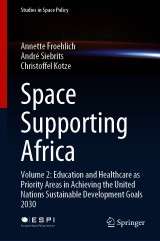Details

Space Supporting Africa
Volume 2: Education and Healthcare as Priority Areas in Achieving the United Nations Sustainable Development Goals 2030Studies in Space Policy, Band 27
|
96,29 € |
|
| Verlag: | Springer |
| Format: | |
| Veröffentl.: | 19.12.2020 |
| ISBN/EAN: | 9783030617806 |
| Sprache: | englisch |
Dieses eBook enthält ein Wasserzeichen.
Beschreibungen
<p>This book addresses the need to support decision-makers across Africa by promoting awareness of the importance of space technologies and data to African development through the presentation of existing examples where space supports education and healthcare, and by making recommendations for further roll-out of these efforts. This is necessary because of the enduring misconception that space-related research and expenditure competes with other, more pressing, needs on the continent, when in truth space can play a major role in meeting these needs.</p><p>Accordingly, the book unpacks the United Nations Sustainable Development Goals (SDGs) 2030 and the critical needs they address in the African context. Secondly, it provides an analysis of the African higher education landscape and considers the network of higher education-related SDGs, their targets, and their indicators. Africa’s own development plan, Agenda 2063, is also explored. The African higher education landscape is then assessed by way of three models – the Space-Education Equation (SEE), the Benefits to Education by Space Transection (BEST), and the Enhanced Education for Sustainable Development Access and Success (EESDAS) model. The critical role of educational technologies and e-learning in bridging the educational access and success gap is appraised, as is the role of the space sector, and its technologies, applications, and data in African higher education. Finally, it explores e-health and provides an analysis of pertinent technologies required by e-health, past and present, and the opportunities and challenges it presents. Space technology can play a critical role in eliminating the barriers that are currently preventing e-health from playing a more significant role in a developing region such as sub-Saharan Africa.</p>
Towards the Sustainable Development Goals in Africa: Space Supporting African Higher Education.- e-Health: How evolving space technology is driving remote healthcare in support of SDG’s.
This book addresses the need to support decision-makers across Africa by promoting awareness of the importance of space technologies and data to African development through the presentation of existing examples where space supports education and healthcare, and by making recommendations for further roll-out of these efforts. This is necessary because of the enduring misconception that space-related research and expenditure competes with other, more pressing, needs on the continent, when in truth space can play a major role in meeting these needs.<p>Accordingly, the book unpacks the United Nations Sustainable Development Goals (SDGs) 2030 and the critical needs they address in the African context. Secondly, it provides an analysis of the African higher education landscape and considers the network of higher education-related SDGs, their targets, and their indicators. Africa’s own development plan, Agenda 2063, is also explored. The African higher education landscape is then assessed byway of three models – the Space-Education Equation (SEE), the Benefits to Education by Space Transection (BEST), and the Enhanced Education for Sustainable Development Access and Success (EESDAS) model. The critical role of educational technologies and e-learning in bridging the educational access and success gap is appraised, as is the role of the space sector, and its technologies, applications, and data in African higher education. Finally, it explores e-health and provides an analysis of pertinent technologies required by e-health, past and present, and the opportunities and challenges it presents. Space technology can play a critical role in eliminating the barriers that are currently preventing e-health from playing a more significant role in a developing region such as sub-Saharan Africa.</p>
Includes comprehensive analysis of different approaches taken by emerging African space faring nations Presents an analysis of how space is supporting civil societies in Africa, and how it can do so in future Written by experts in the field
Diese Produkte könnten Sie auch interessieren:

How Insights from Moral Psychology and Character Research can aid Development Cooperation

von: Jan Prothmann

13,99 €
















